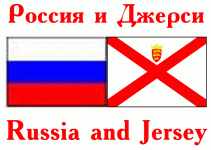
Impressions of Leningrad
As gathered by a Jersey schoolboy

Several hundred British schoolchildren recently returned home after a fortnight's educational cruise around Baltic ports aboard a former troopship, the Dunera. They went ashore several times and later, when they were back on board, they had to write down their impressions.
Among them were six pupils from St. John's School, Jersey, including 15-year-old John de Carteret. What he thought of Leningrad and the Russian people is reproduced below, without any alteration, from an essay he wrote at the time.
|
As we came into Leningrad docks my first impression was of a very industrial city with tall chimneys, and big, smokey buildings. As the tugs pulled the Dunera alongside the docks, the Russians gathered alongside and gave us a great welcome and later presented us with badges and postcards of - as they said - their wonderful city.
As we got closer to the crowd, we saw that they were very sociable and helpful. but the buildings, which were poor, were in desperate need of repair. Conditions of living, judged from the outside, seem very poor indeed.
Going ashore
We were supposed to disembark at 09.00 hours. but because of passports, identity cards and other papers which the Russian officials wanted to see in the café lounge, we were not called to muster stations before 14.00 hours and then we disembarked, giving in our passports as we did so. Later, we went through the docks and into some coaches which were waiting some distance away. The coaches, in my opinion, were rather uncared for and seemed to be in a state of disuse. The coach driver seemed to be very unsure about the proceedings. The guide did not speak English. as well as some other Russians who were not guides.
At roughly 16.00 hours, we arrived at the new Russian sports stadium which was finished in 1950. The stadium is as big as Wembley and can hold one hundred thousand people. It is built on a huge man-made hill. The ground upon which the stadium is built was shovelled up from the nearby Gulf of Finland. This vast stadium is extremely well kept and lies in the town suburbs. The people of Leningrad seem fairly happy but scared to say too much about current affairs of their city and country. As soon as they are asked for information about Russia they keep silent. This applies only to political subjects however, and then they change the subject and start afresh on something else as if there is a limit to what they can say.
Suspicion
In Leningrad, Lenin commands more respect than Stalin. The Russians do not seem to trust anybody, including their own relations. Suspicion is always on their faces and in their actions.
The streets and conditions in Leningrad are shocking and you cannot tell the difference, between old and new buildings. Houses are left to go to ruins and on some windowsills there are there are weeds growing. The only buildings cared for are museums, palaces of the late Tzars and theatres for ballet, for which art the Russians are world famous. A well-known ballet centre is the Pushkin Theatre, which is situated in the heart of Leningrad. The churches are dirty and many have broken windows and are in desperate need of repair.
In the suburbs of the city you would not recognize the shops unless you were walking along the street or studied them in detail while passing. There are no shop windows as in big stores at home. but they look vaguely like converted houses. There is little of any display of goods outside the shops. The only display we saw was in the big stores in the main shopping street, the Nevski Prospect. The clothes the Russian people wore were dull and all were of dark colours. We had a packed dinner on the coach trip and arrived back on board at 17.00 hours.
The Palace of Pioneers
Next morning we disembarked punctually at 09.00 hours and passed the Russian officials rather more quickly this time. We then went in coaches for a trip to the Palace of Pioneers, where people who are interested in science and other subjects meet. Here they can enrol for scientific and geological expeditions taking place in their holidays. The society is for young people still at school. The Palace of Pioneers is rather like one big youth club, for included are many indoor games, where Russian children can sit or play and enjoy themselves.
In the hall we talked with Russian children but always we came to a stumbling-block and this is where they changed the subject. After having a good look round the Palace of Pioneers we proceeded to buy some souvenirs. Our guides took us to a big store which catered for everything and was fairly clean, but as in most large Russian buildings, there was a definite smell. Whether this was a disinfectant we never really found out.
Memento
At this store I had my watch engraved with the name of the big store and "1962" After this we went back to the coaches which took us back to the ship.
The Dunera left Leningrad at 18.00 hours and as we left I felt sorry for the Russian people, but I respect them because I think they have a great deal of courage to live in those conditions and in that atmosphere.
Evening Post 21/7/1962
R'tou à la page d'siez-mé | Back to home page


